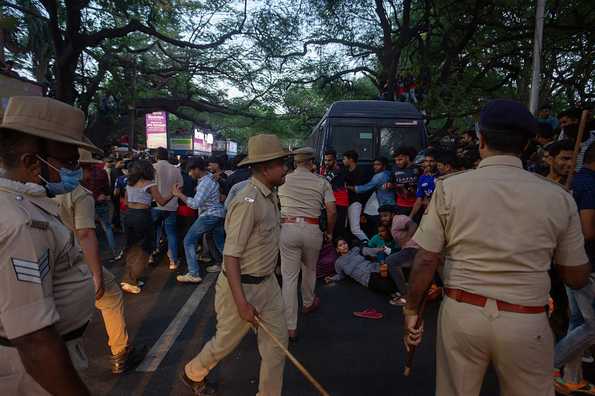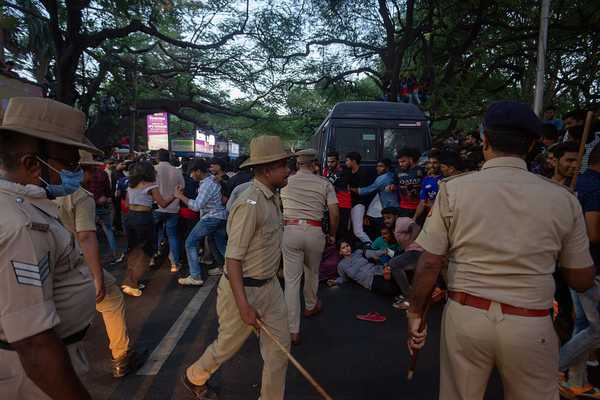BENGALURU STAMPEDE

The stampede in the RCB victory parade left 11 dead and over 50 injured. © Getty
Bengaluru’s M Chinnaswamy Stadium has been declared “unsafe for large-scale events” by the Justice John Michael D’Cunha Commission appointed by the Karnataka government following the stampede on June 4 which left 11 people dead and over 50 injured. The panel’s findings, submitted to the government, cast doubt over the stadium’s eligibility to host marquee events.
The committee, which investigated the stampede, pointed towards inadequacies in the stadium which was selected as the venue for Royal Challengers Bengaluru’s (RCB) victory celebrations a day after their maiden IPL title win.
“The design and structure of the stadium was unsuitable and unsafe for mass gathering. All the entry and exit gates were directly opening into the public footpath. Spacious and organized holding area for crowd were not provided at the entry, as a result, the audience were forced to queue up on the footpath or the road abstracting and endangering the pedestrians and vehicular movements as well as giving scope for the miscreants to join the crowd, aggravating the risk especially in the absence of proper security management.
“…Given these systematic limitations the commission strongly recommends that stadium authorities consider relocating events that are expected to attract large crowds to venues that are better suited for such large gatherings. Any future venue should adhere to international standards, including: Purpose – built queuing and circulation zones separated from public roads; Adequate entry/exit gates for mass entry and exit (ingress and egress); Integrated public transport access points and tourist hubs; Emergency evacuation plans compliant with international safety norms; Sufficient parking and drop off infrastructure to handle attendee volumes.
“Until such infrastructural changes are made, continuing to host high attendance events at the current location poses unacceptable risks to public safety, urban mobility and emergency preparedness,” added the report.
The M Chinnaswamy Stadium is set to host the upcoming Maharaja T20 tournament, which will be played behind closed doors. The venue is also scheduled to stage several high-profile fixtures of the Women’s ODI World Cup, slated between September and November, including the opening match, one of the semifinals, and possibly the final.
Meanwhile, the report put the blame squarely on the organisers, stressing that “reckless announcement” about the entry for the RCB celebrations was the main reason for the unfortunate turn of events.
“Stampede was triggered by the organizers themselves by not regulating the entry into the gates and making reckless announcement with regard to the entry into the stadium which in the opinion of the commission is the root cause for the stampede and the consequent death and injuries. This situation was created by the organizers themselves due to the lack of preparation and hasty decision which tantamount to recklessness bordering on gross negligence, for which the organizers should be made accountable. The organizers failed to make any arrangement for the safety and security of the invitees.”
Among their key findings, the commission also noted that the organisers – RCB, DNA Networks and KSCA – did not obtain permissions to hold the victory parade celebrations, and that the event was unauthorized and hastily organized, with no proper security, crowd control, or emergency arrangements in place. The committee also blamed the Police for failing to intervene despite knowing the event was unauthorized. and suspected collusion between organizers and police officials.
Justice John Michael D’Cunha’s report also recommended action against RCB vice-president Rajesh Menon, DNA Networks MD T. Venkat Vardhan and VP Sunil Mathur, as well as KSCA president Raghuram Bhat, former secretary A. Shankar and ex-treasurer E.S. Jairam – the latter two having resigned citing moral responsibility. The report held several senior police officials equally accountable, including Commissioner B. Dayananda, Additional Commissioner Vikash Kumar, DCP Shekhar H. Tekkanavar, ACP C. Balakrishna, and PI A.K. Girish – all of whom had been removed from their posts by the chief minister in the aftermath of the tragedy.
The Karnataka cabinet formally accepted the findings of the commission, and the government, led by chief minister Siddaramaiah, is preparing further legal action based on the report. Earlier, the government had its status report made public on July 17, two days after the Karnataka High Court directed its release. In that, the government held RCB, DNA Networks and the KSCA responsible.
© Cricbuzz
